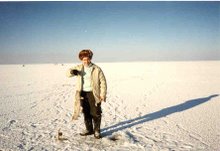A little more on John Ferguson, 1938-2007
Ferguson was a force on and off the ice
TOOK ON ANYONE He also proved to be a great hockey mind
WAYNE SCANLAN CANWEST NEWS SERVICEOTTAWA CITIZEN
OTTAWA – Bobby Hull knew the fury of those fists. Hull, the great left winger of the Chicago Blackhawks of the 1960s and ’70s, had more than one bloody encounter with John Ferguson of the Canadiens.
At news that one of his fiercest adversaries had succumbed to cancer during the weekend, Hull was struck, above all, by a renewed sense of his mortality. Ferguson was 68. “It’s a shame when a guy has to suffer as long as he did,” Hull said yesterday from his home near Kingston, Ont. “I feel for his family and close friends.
“Every time another soldier falls, it brings us closer to the wall,” Hull said. “I’m going to be 69 in January. Where has the time gone?”
Hull respected Ferguson for his work as an NHL enforcer, although it might have cost Hull’s Blackhawks a Stanley Cup. In the 1960s and ’70s, the Canadiens and Blackhawks met three times in the final, and Montreal won all three.
The grace of Jean Béliveau, the speed of the Canadiens, the goaltending of Gump Worsley and Charlie Hodge (1965), and then Ken Dryden (1971, ’73) were factors.
But in that ’65 meeting, it was a beating put on Eric Nesterenko by Ferguson that swung the series. Whether accidentally or with a purpose, Nesterenko brought his stick down on Ferguson’s head in Game 5 – and paid for it with three vicious rights to the face by Ferguson.
Bleeding profusely, Nesterenko went off for “repairs,” and did return, but sheepishly. Montreal won the game 6-0, and though the Blackhawks pushed the series to the limit, their will was gone. Chicago fell in Game 7, 4-0.
Béliveau, the Canadiens’ captain, gave credit to Ferguson’s “hammering fists” for the role they played in that championship. Not exactly the image of the “firewagon” Canadiens of that era, but an honest assessment by Le Gros Bill.
In an eight-year NHL career, Ferguson won five Stanley Cups. He left the Canadiens on poor terms in 1971, not happy with his experience under head coach Al MacNeil, despite winning the Cup that season.
Though Ferguson twice scored 20 or more goals, proving his value beyond a mere goon, there were certainly better players. Arguably, there might have been tougher ones, though not many.
Other than Rocket Richard, there might not have been a player as intense as Ferguson.
Dick Irvin tells the story of Ferguson staggering into a postgame interview like a wild animal.
This was in 1967, when Irvin was a rookie on Hockey Night In Canada.
The Canadiens had swept the New York Rangers in four games, and Ferguson scored the overtime winner in Game 4 at Madison Square Garden.
Irvin waited five long minutes for the post-series handshake ritual – plenty of time for the average player to calm down. Not Ferguson. “I thought the guy was going to pass out,” Irvin said. “His eyes were rotating in his head, he couldn’t get his breath, he was hyperventilating.
“I asked him a particularly long question, to let him catch his breath, and I made sure it was a ‘yes/no’ question, so he could gather himself. But he scared me. I didn’t know if he was going to hit me – he was gasping for breath.
“It was just the moment. He was still caught up in scoring that big goal.”
Béliveau would say Ferguson was every bit as intimidating to Montreal’s players as he was to the opposition. He demanded a measure of his own intensity in his teammates.
In his off-ice roles, the fire still burned within.
It was Ferguson, as an assistant coach of Team Canada in the 1972 Summit Series, who encouraged Bobby Clarke to take out Valeri Kharlamov, the gifted Soviet forward.
When Ferguson was general manager of the Winnipeg Jets of the NHL, Irvin remembers being in the visitor’s radio booth when a shower of white paper flew out of the GM’s booth beside him, as a frustrated Fergie responded to a situation on the ice.
For a fighter with limited hockey gifts, Ferguson showed a remarkable versatility after retiring as a player. Equally adept at judging race horses and rising hockey talent, Ferguson coached the Rangers and then stepped in to become the face of the Jets, in the World Hockey Association and NHL, for a decade beginning in the late 1970s.
In an odd twist, Ferguson won an Avco Cup as GM of the Jets in their final WHA season, with Bobby Hull, his old nemesis, starring at left wing.

No comments:
Post a Comment